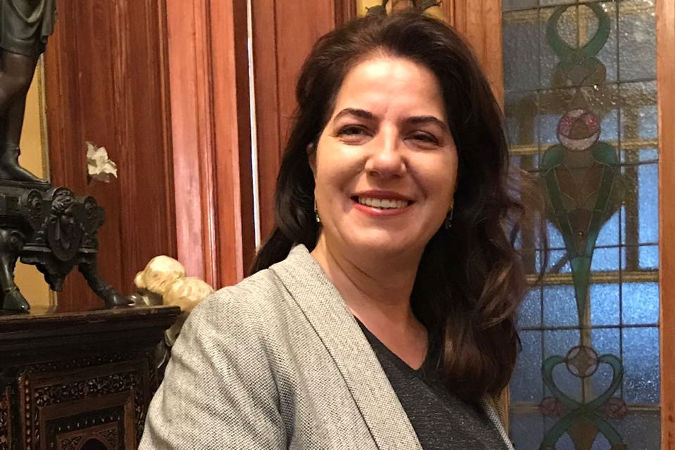Take Five: “Academia’s potential to promote human rights and peace needs to be utilized”
Date:

Dr. Remzie Istrefi, a Professor in the Department of Law at the University of Pristina, is the coordinator of the first Transitional Justice Research Centre in Kosovo[1] which is based in the University. The Centre was launched in May this year in Pristina by the University of Pristina, UN Women and UNDP with financial support from the European Union. The Centre aims to enhance the role of education in transitional justice processes, peace-building, human rights, and establish conditions for reconciliation. The Centre also provides a gender perspective on transitional justice processes with an in-depth focus on sexual violence during conflict.
Where does Kosovo stand with ensuring transitional justice almost 20 years after the conflict? What have been some of the challenges and opportunities?
Different measures have been initiated. Civil Society Organizations are actively working with victims of violence, victim’s representatives, and their families; authorities have undertaken steps in order to deal with the past and international agencies have contributed to awareness raising and enhancing support to various groups affected by the conflict.
The main challenge remains in the coordination of all these initiatives. Very often some activities are doubled, some overlooked, while some vulnerable groups have not been assisted. The greatest potential lies in the overall consultation process. A holistic and all-inclusive consultation process would lead to a possibility to institute the most adequate Transitional Justice measures that will help society move forward and with it ensure a long lasting and sustainable peace.
What has been the role of academia in transitional justice processes in Kosovo?
Since the end of the conflict, academia has played an important role in educating the younger generations. Different study programs have been introduced, integrating courses that contribute to peace-building, such as human rights, gender equality, multiculturalism, among others. Also, different thematic workshops, speeches, conferences, and study visits have been organized where students have had the opportunity to discuss and learn about the past and measures that have been initiated to deal with its lingering issues.
Why is it important to have academia involved in transitional justice processes?
It is of utmost importance that academia is involved in the transitional justice process because academia is populated with the youth. Academia provides an impartial platform to discuss the intricacies of the transitional justice process. Academia also serves as a forum for discussion for all relevant stakeholders of the transitional justice processes in Kosovo and highlights the role of academics in transitional justice processes. Academia’s potential to support the on-going efforts in the field of human rights, multiculturalism and peace studies needs to be utilized. This would contribute further to the transitional justice process that Kosovo society is undergoing.
What is the role of the Transitional Justice Research Centre at the University of Pristina?
The Transitional Justice Resource Centre (TJRC) at the University of Pristina was established in May of this year and is the first research centre established through the University of Pristina and the first institution of its kind not only in Kosovo, but also in the region. The TJRC was established with the purpose of enhancing the role of education at the University level regarding transitional justice processes by providing education programs, scientific research, and awareness-raising activities. As such, the Centre serves as an education hub and public gathering space for everyone in Kosovo dedicated to learning and collaborating on transitional justice research, policy, and civil society initiatives.
The TJRC aims to increase the contribution of academia to the transitional justice processes in Kosovo and offer academic resources in the field; foster discussion regarding transitional justice issues amongst academics, civil society, and public institutions; facilitate university students’ understanding of transitional justice, human rights, gender-sensitive approach and peace-building processes as integral parts of the education systems; develop cooperation with other regional and international institutions, transitional justice centers and institutions with similar missions; and provide access to up-to-date information about gender-sensitive and survivor-centric approaches to transitional justice.
How will the TJRC support a gender-sensitive approach in transitional justice processes?
Through the activities of the TJRC, we aim to highlight the prevalence of sexual and gender-based violence, and to explore opportunities to develop creative ways to think about what else might be needed to ensure that gender concerns are incorporated into the work on accountability for the past. Through academic research at the TJRC, we will explore the links between past and present forms of violence. Students will be able to learn lessons from other international experiences about the nature of gender-based violence during conflict and the ways in which women often experience it as a continuation between earlier and later forms of discrimination and violence. We will also examine the ways in which transitional justice processes, such as truth-seeking and reparations, have had to adapt to become more responsive to the needs and demands of survivors of gender-based violence.
[1] All references to Kosovo on this website shall be understood to be in full compliance with UN Security Council Resolution 1244 (1999).